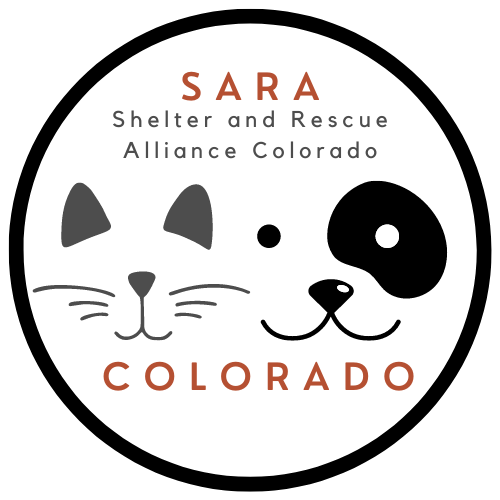Colorado Rescue Act
HB24-1114 is an act to add a section to the Colorado Department of Agricultural Code relating to animal Shelters in 8 CCR 1202-15. This act shall be known and may be cited as “The Colorado Rescue Act: Protecting Colorado Homeless Pets". This act increases the chance of life for healthy and treatable pets in danger of shelter euthanasia.
Consider writing letters to representatives. CLICK HERE for more info!
Join dozens of organizations that already support saving lives and the Colorado Rescue Act!
Would your organization like to be included on our support page? Click here to join us!
Whether you are PACFA rescue, animal welfare or pet-related business, or any organization with the compassion to help save homeless pets. Let us know if you support the Act and send us your logo to be added to the support page.
The intent of the Colorado Rescue Act is to save every healthy and treatable homeless pet. The bill aims to achieve this by promoting collaboration between Colorado rescues and shelters. It encourages rescues to prioritize local animals in need before seeking pets from outside the state. Additionally, the act seeks to establish a process that would track all animals in need, making it easier for PACFA licensees to work together and save lives. Overall, the Colorado Rescue Act aims to improve the coordination and efficiency of pet rescue efforts in the state, with the ultimate goal of reducing the number of shelter pets dying in our shleters and finding loving homes for all animals in need.
A bill still being drafted would require animal shelters to post a list of healthy and treatable animals they plan to euthanize 72 hours before they plan to do so.
Henry did not even bite anyone. he got exciited at a meet and greet. He was killed on October 21
A study of a rescue ordinance in another state found that while the placement of dogs climbed from 69% to 98%, the percentage of dog bites deemed moderate or severe declined by 13%, with the most significant decline in the number of bites classified as “severe,” which fell by 89%. (Hawes, Sloane, Devrim Ikizler, Katy Loughney, et al., ‘Legislating Components of a Humane City: The Economic Impacts of the Austin, Texas “No Kill” Resolution (City of Austin Resolution 20091105-040)’ (2017) University of Denver Institute for Institute for Human-Animal Connection.)
Studies prove that “displaying concerning or dangerous behavior was not significantly associated with return to the shelter, and positive predictive values were low, implying that many positive tests will be false positives.” (McGuire, Betty, Kennedy Jean-Baptiste, ‘Relationships between demographic characteristics of shelter dogs and performance on tests of a behavioral evaluation and between performance and adoption success’ (2023) Journal of Veterinary Behavior 66, 11-19.)
Canelo. Dog tested face to face. Killed for "biting" the other dog on the face. No skin broken. Killed next day.
Watson was saved (with hundreds of advocate, countless hours of calls and letters) I t should not be this hard.
We have over 300 PACFA licensees that can save lives
Since many nonprofit organizations often rescue from multiple shelters, rescue particular breeds, are run by people with other jobs, and are foster-care based, this bill will give them notice of animals needing rescue at multiple shelters without having to travel to each one while giving them time to arrange foster care and accept custody of animals before they are killed. And they cannot be refused if they are PACFA-licensed.
When animal welfare organizations work collectively to ensure that animals are not put to death where lifesaving alternatives exist, more lives are saved, wasteful taxpayer expenditures are reduced, revenues for municipal and private shelters increase, and community economic and social benefits ensue.
Alfie was taken for a single bit incident and the person bit did not even want medical attention
Save More Lives
The bill would increase the number of animals rescued at private expense, instead of killed at public cost, by requiring shelters to post a 72-hour notice of their intent to do so on. Shelters would not incur additional costs because notice can be posted on an existing website and automated using freely-available shelter management software.
Maintain Public Safety
This bill would not change longstanding state law regarding dangerous dogs and dogs who cause serious physical injury. Since these dogs and animals who are irremediably suffering are explicitly exempted from the notification and placement requirements, there would be no negative impact on public safety.
The University of Denver study also concluded that legislation of this type was not only consistent with public safety but also improved it, noting positive impacts on “public health, social capital, and community engagement,” all of which have “important implications for [a community’s] ability to promote and sustain the health and well-being of both its human and non-human animal residents.”
Improve Transparency
Additionally, some shelters may argue that posting pending euthanasia would make them look bad. However, taxpayers have a right to know how their local shelters operate. More importantly, shelters would kill fewer animals, reducing staff workload, stress, and mental suffering and increasing volunteerism. Finally, the increasing placement of animals due to the notice would improve their community standing.
Enhance Work Environment
The emotional stress for shelter workers and volunteers increases with the deaths of animals in our shelter system. Compassion fatigue comes in a variety of symptoms and is exacerbated by the death of animals that caretakers experience.
Lower Shelter Cost
Some shelters and their statewide lobbying organizations may oppose the bill, citing costs. It costs nothing to transfer a pet. In fact, the cost of ending a pet’s life costs more than allowing a PACFA-licensed organization to simply take it off your hands. However, existing shelter management software, including those available to shelters for free, allows this notice to be posted automatically or with the proverbial “two strokes of a keyboard.” HB-23-xxxx would not require the hiring of additional staff or an increase of workload.
THE COUPLE WAS ASSURED BY STAFF WITH WHOM THEY MET THAT IF the shelter COULDN'T FIND ECHO A NEW HOME THEY COULD HAVE HIM BACK
Echo had rescues and trainers as well as his original family willing to take him but all were denied. Echo was killed February 2023. You can read his story HERE.












